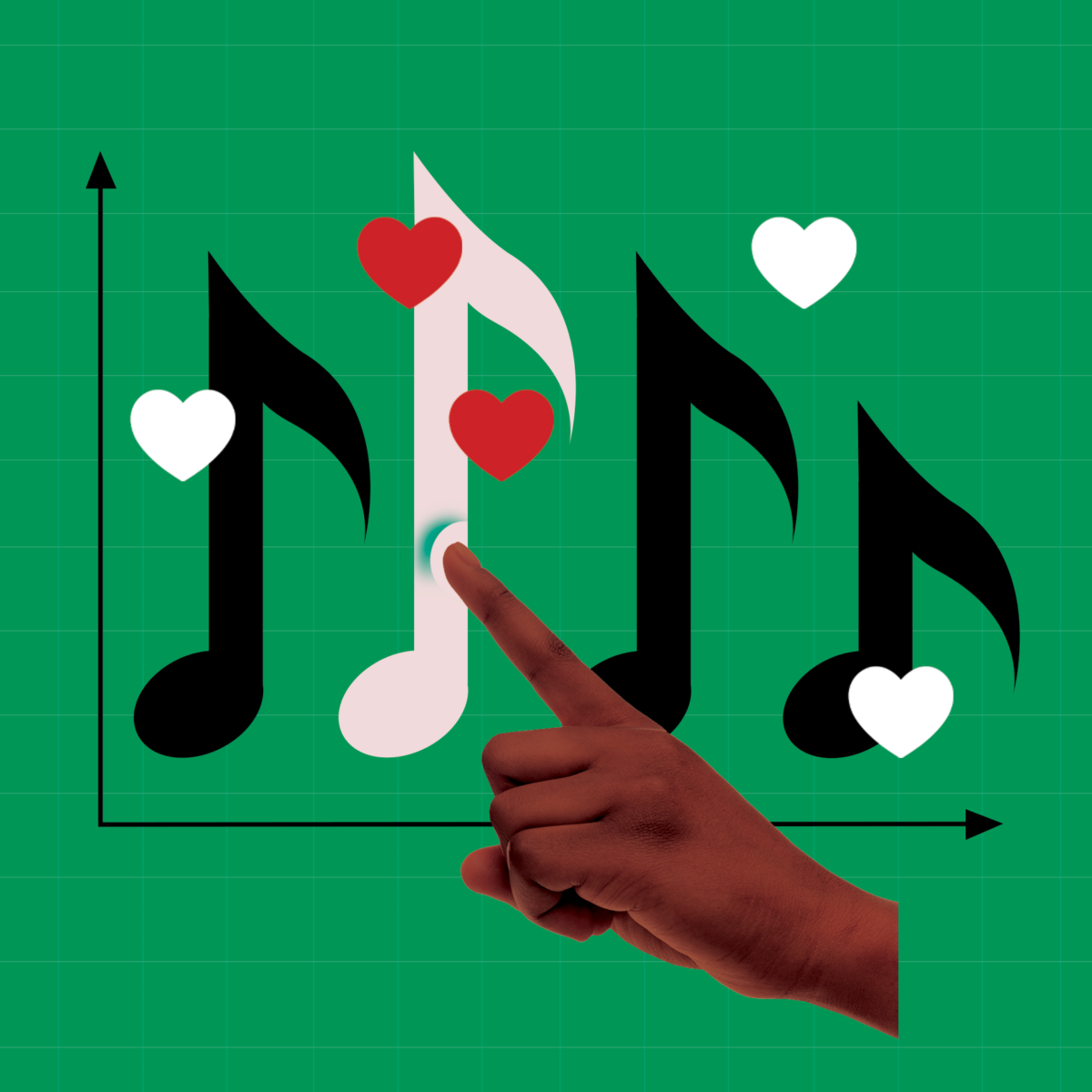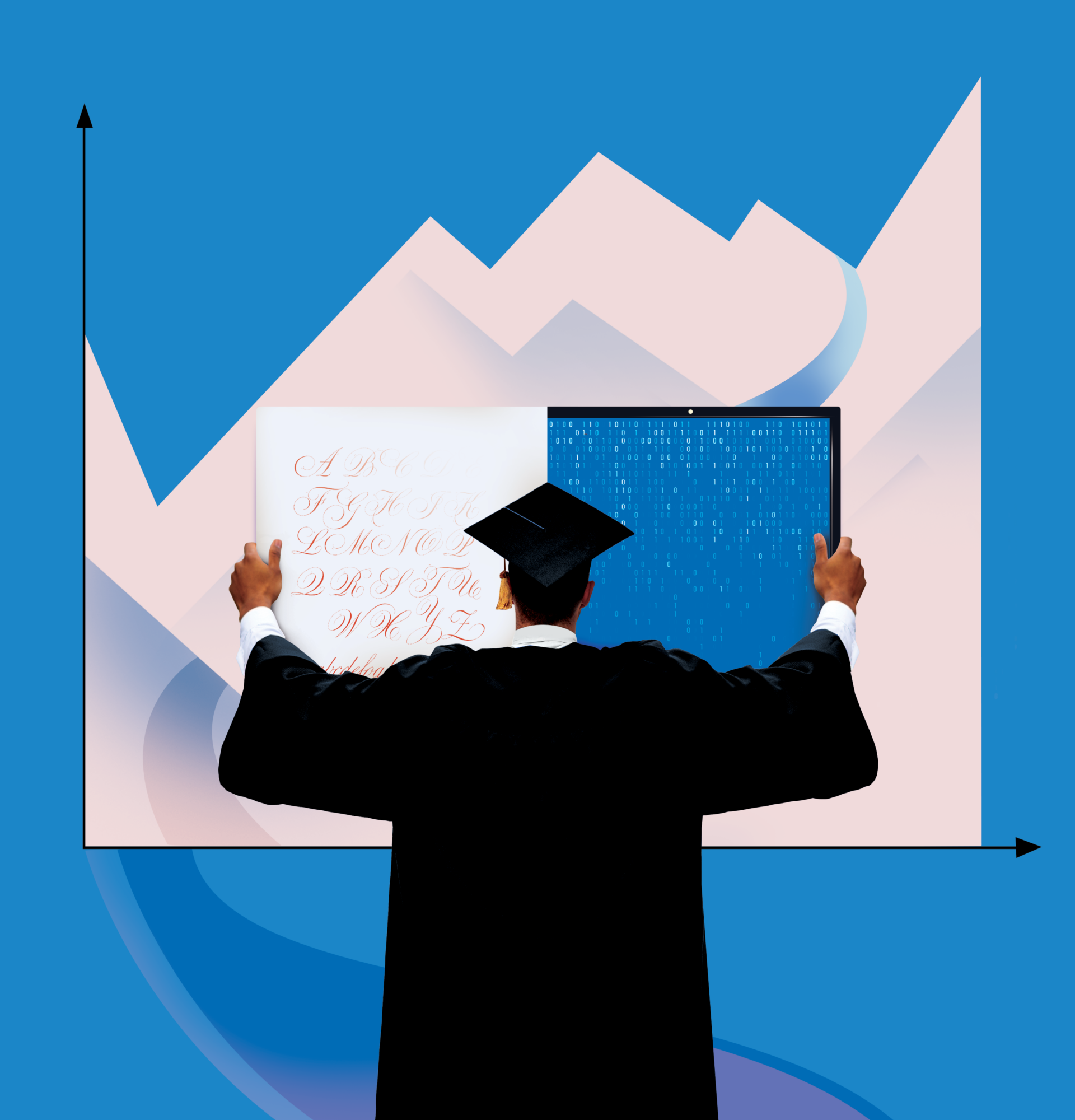Computing for All
Memphis Johnston never saw herself as a STEM person. At her high school in Brooklyn, New York, she said she largely confined herself to the humanities partly because the overwhelming majority of math and science students and teachers were men.
At USC, Johnston took Journalism 494: Python Coding for Digital Journalism. Taught by Iris Lee, a former assistant editor at the Los Angeles Times’ Data and Graphics desk, the class showed the 20-year-old public relations major the power of using data to create graphics to augment stories. It also demystified the process of gathering and analyzing data via digital tools.
Johnston began thinking about how a deeper understanding of data could help her professionally, whether she decided to become a public relations professional, lawyer or something else. In PR, she said, she could use data “to immediately parse [PR] campaigns and see what works, who the demographics are and where you should put resources based on your findings.” If she went into copyright and tech law, Johnston said an understanding of data would increase her analytical skills and make her a better attorney.
So, Johnston decided to minor in the foundations of data science in the USC Viterbi School of Engineering’s Technology and Applied Computing Program, or TAC. (Until recently, it was known as the Information Technology Program, or ITP.) She has so enjoyed her TAC classes, including an introduction to data science, that she now plans to apply to USC Viterbi’s progressive degree program, which would allow her to earn a bachelor’s degree in PR and a master’s in communication data science in five years.
“Anything that you have that’s even slightly STEM-related can be helpful, just because I think that’s where the trajectory is kind of heading, at least for my generation,” said Johnston, who spent the summer as an intern at the Office of the New York City Comptroller. “Having a data science background can be very helpful.”
Lizzy Lourenco is another Trojan who decided to complement their non-STEM major with a technical minor. (Lizzy goes by they, them and their pronouns.) Lourenco graduated in spring 2024 with a B.F.A. in technical direction and a TAC minor in computer programming. Lourenco now has a coveted job with Tait Towers, a live entertainment production company that specializes in automation, scenery and staging for clients such as Taylor Swift, Cirque du Soleil and the Rolling Stones.
“I would not be the person I am today without this minor,” Lourenco said. “Through [TAC], I was able to further explore my interests while developing my personal brand of technical artistry. I’m 1,000% sure that I would not be as effective in my current position with Tait without going through my minor or taking computer science courses at a university level.”

Rising interest in computing, data science and AI
Like Johnston and Lourenco, a growing number of USC students with social science, humanities and arts backgrounds are increasingly drawn to computing, data science and AI. As the world enters the so-called Fourth Industrial Revolution — an era of improved efficiencies, productivity and quality driven by artificial intelligence and other technologies — history, philosophy and English majors see the value of becoming technologically conversant as never before.
Reflecting that rising interest among non-engineers, the Technology & Applied Computing Program now features three of USC’s top 10 minors. Applied analytics was the university’s most popular minor, as of October 2023, with more than 500 students. The artificial intelligence applications minor placed seventh, while computer programming ranked 10th. About 80% of TAC students have non-Viterbi backgrounds, said Eric Perez, the program’s associate director of advising and recruitment.
“If we’re going to graduate students who really are informed citizens, they need to be able to understand the data that they’re working with; they need to understand the implications of the algorithms behind what they see,” said Erik Johnson, TAC’s interim director and USC Viterbi’s vice dean of academic programs. “I think it’s essential for the future of our society.”
Johnson added that digital tools now positively impact fields not typically associated with the sciences. Artists, he said, use generative AI to brainstorm ideas and even produce artworks. Historians leverage AI to translate obscure languages and even to identify topics or themes in old documents. Political consultants analyze the metrics of social media campaigns to determine the demographic makeup of their audience and where to best allocate resources.
“Data has become ubiquitous, and every field is being affected by its availability,” Johnson said.
Added USC Viterbi Dean Yannis C. Yortsos: “Equipping our students, both in STEM and non-STEM disciplines, with the ability to categorize, process and extract meaning from data is an essential aspect of education.”
Against this backdrop, the university recently launched its first new school in more than a decade, the USC School of Advanced Computing, a unit of USC Viterbi. A cornerstone of USC President Carol Folt’s $1 billion Frontiers of Computing Initiative, SAC will turbocharge the engineering school’s ability to educate students from across campus and across disciplines in the power of advanced computing. It will also bring together engineers, scientists and professionals to leverage computing to address climate change and other major challenges. SAC will appoint 30 new faculty members in priority areas by 2027, and 60 by 2030.
“USC requires all students to complete general education requirements spanning various subjects. It is time to add a computing requirement to that list,” said Gaurav Sukhatme, inaugural director of the School of Advanced Computing and USC Viterbi’s executive vice dean. “Digital competency, which most USC students achieve already, will not do; our graduates need to be digitally fluent.”
Sukhatme added that the SAC will benefit students throughout the university for decades to come. In the realm of AI, the School of Advanced Computing will partner with schools throughout USC to augment all classes in the field.
Similarly, USC Viterbi’s Technology and Applied Computing Program will become even stronger with the hire of several new TAC professors, he added. “Our existing faculty are exceptionally good at mentoring new faculty who we are bringing in to become agents of change.”

Enhancing digital skills and career opportunities
Senior Preston Doll is glad that his minor in AI applications has given him much of that digital fluency. The USC Marshall School of Business major, with a focus in finance, said the combination of business and AI has not only given him invaluable skills to pursue his dream of becoming an investment banker, but it has also made his USC academic journey more fulfilling and complete.
“I think my Marshall education has been great and is providing this broad sort of insight into everything business. I’ve had a chance to explore various fields of interests, from marketing and organizational behavior to economics and finance, which I found my passion in,” said Doll, who landed a prestigious paid internship this summer with Ducera Partners, a New York-based investment bank with an expertise in corporate restructuring. “And learning about AI, especially given how prominent it has become today, just feels like I’ve been able to supercharge that education as a whole. I feel a lot more confident going into the workforce.”
Doll has already put some of that AI knowledge to use. During his junior year, he worked as a contractor for Portrait Analytics, a Boston-based firm that creates generative AI research tools to help financial analysts conduct in-depth investment research quickly, easily and efficiently. At Portrait, Doll said he collected financial data from quarterly and annual reports, among other sources, to train Portrait’s large-language models.
“Had it not been for this combination of the financial and AI acumen, I don’t think I would have been as effective in my role at Portrait, or even landed the position,” he said.
Similarly, Kayla Sarno believes she has greatly benefited from her USC Viterbi classes. A music industry major in the USC Thornton School of Music, the 23-year-old senior decided to minor in the foundations of data science after she realized how much the ability to collect, sift through and analyze data could help her in the music business.
A music marketing executive, Sarno noted, could look at Spotify and Apple Music analytics to see where an artist’s new music is most popular and with what age groups, and then focus marketing dollars there. Additionally, ascertaining an artist’s popularity (or lack thereof) — based on song streams, video views, and shares and likes on Instagram, TikTok and other platforms — provides important information for booking the right size concert venues in a given market.
On a personal level, Sarno said her growing knowledge of data has helped her flourish academically. In Music Industry 497, a class that explores emerging topics and trends in business and technology in the music and entertainment industries, she and her team had to create a virtual influencer to try to generate as much online engagement as possible. They developed a humanlike character named Ricky Rock and began posting content on Instagram, TikTok and SoundCloud. An analysis of the data showed that Insta was the most popular platform, especially Instagram Reels, or video shorts.
Given that the Reels’ viewers skewed young, Sarno suggested that her team begin targeting teenagers. So, they redesigned Ricky Rock to make the virtual influencer more animated-looking and cooler. The team also created humorous Reels to appeal to middle school and high school students. The result: Audience engagement rose about 25%.
“I think knowing data science can help me not only in the music industry, but also in a lot of businesses,” said Sarno, who aspires to become a songwriter and artist after graduation. “A lot of people, especially artists, are trying to figure out how to market themselves, where their audience is coming, and how to read data.”
Josh Raghavachary, a 20-year-old psychology major who’s also minoring in foundations of data science, said he has found his TAC data classes so interesting that he now wants to pursue a career in the field.
“With the rise of Internet of Things, where we have our dishwashers and laundry machines all hooked up to the internet, and with the [emergence] of companies like ChatGPT, there’s so much data constantly being generated and collected,” Raghavachary said. “Somebody needs to be able to comb through it, sort it and analyze it. I can definitely see myself being that guy.”
FAQ on SAC … Your Questions on the New School Answered
Much ink has been spilled on the new USC School of Advanced Computing, or SAC. However, not everyone understands how transformative it promises to be — or even what exactly it is. Here are some answers to your burning questions.
Q: I’ve heard a lot about the School of Advanced Computing. Are you folks in the Viterbi School’s Communications and Marketing office just trying to rebrand the Department of Computer Science with a fancy name?
A: No. It’s like the Department of Computer Science on steroids to the power of 10. The centerpiece of USC President Carol Folt’s Frontiers of Computing — a $1-billion, 10-year initiative that supports the advancement of artificial intelligence, robotics and quantum computing within an ethical framework — the SAC will serve as the hub for advanced computing research and education for all of USC. As Gaurav Sukhatme, the school’s inaugural director, noted: “It’s not enough for all USC graduates to be digitally competent. In a time when most companies are technology enabled, all USC graduates — from East Asian studies to engineering — must be digitally fluent.” The school will be the “beating heart for all things computing” across all 23 USC schools.
Q: OK. But what exactly is the School of Advanced Computing? I still don’t get it.
A: Let me explain. Operating as a unit of USC Viterbi, the SAC includes the newly renamed Thomas Lord Department of Computer Science, as you suspected. But it features much, much more. It also includes the Ming Hsieh Department of Electrical and Computer Engineering, Technology and Applied Computing, and Interdisciplinary Data Science. Key to the school, also, will be new “faculty affinity groups,” which will ID and build upon faculty across USC in computing plus sustainability, health, arts and humanities, security, social sciences, scientific discovery and quantum, and more.
Q: So, in essence, it’s just repackaging a bunch of existing USC Viterbi departments and programs, right?
A: Nope. The SAC will strengthen advanced computing at USC by bringing it under one roof and infusing it with major resources. Thirty new SAC faculty members will be appointed in priority areas by 2027, and 60 by 2030. Not only will they enhance educational and research opportunities available to undergraduate and graduate students, but the additional faculty will also spark innovation by starting new companies and collaborating across academia and industry.
Q: I’m looking at a map of USC, but I don’t see the School of Advanced Computing on it. What’s up?
A: Good question. The Dr. Allen and Charlotte Ginsburg Human-Centered Computation Hall, a 116,000-square-foot LEED Platinum-certified facility, integrates all of our computer science programs into a seven-story structure. That includes the Thomas Lord Department of Computer Science. Having a world-class facility like Ginsburg Hall allows USC Viterbi to continue attracting the best students and faculty by creating an environment in which they thrive.
Q: I’m a history major interested in the French Revolution and the birth of the modern state. Why should I care about the School of Advanced Computing any more than I do about terabytes and processors? What does it have to do with me?
A: We are living in the most technologically advanced period ever, with exponential changes taking place constantly. In today’s world, being technologically conversant not only matters to STEM majors but also to students of poetry, English and even history. Don’t believe me? Well, USC students in the social sciences, humanities and arts are being drawn to computing as never before. The Technology and Applied Computing Program, which offers tech courses for non-engineers, now accounts for three of USC’s top 10 minors, with applied analytics coming in at No. 1, artificial intelligence application at No. 7, and computer programming ranking 10th. The good news: The School of Advanced Computing’s courses are tailored for everyone.




